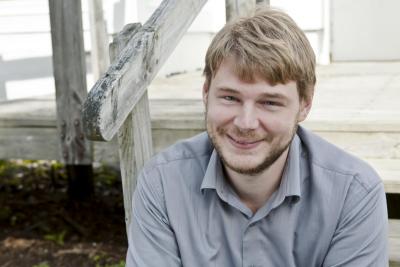John Rush animates economics

“I wanted to be somewhere where teaching would be valued, and to really have the opportunity to know my students,” says John Rush, a professor of economics who joined the Marlboro faculty in August. Before coming to Marlboro, John taught at the University of Hawaii, where he had more than a hundred students in one class and found it hard to make a significant connection with them. He is excited to be at Marlboro, which he considers “an ideal place to be a teacher and to work with students.”
John grew up in northern California and received his bachelor’s degree in economics and a master’s in management from Whitworth University, in Spokane, Washington. He then went on to get his M.A. and Ph.D. in economics at the University of Hawaii at Manoa, where he researched the influence of natural disasters on poverty and inequality in developing countries.
“I have a lot of interests,” says John. “My research up to now has been focused on natural disasters and how they affect economic development, but I’ve also been really interested in the history of economic thought, learning more about the originators of the big ideas we use in economics. Gold rushes are something I’ve studied a little bit about and find really interesting to look at from an economic perspective.” He also wants to further explore the philosophical concept of “weakness of will,” a subject he finds very relevant to the foundations of economic theory.
John finds that his research helps inform his teaching in many ways, whether that’s using natural disasters to help illustrate economic ideas in a vivid and accessible way, or reading broadly to explore new connections with other disciplines. He has taught economics at the University of Hawaii, Kapiolani Community College, and LCC International University in Lithuania, but finds Marlboro especially conducive to his interdisciplinary leanings.
“One of the things I like about Marlboro is that I can read things that I wouldn’t necessarily be justified in reading for my job at other places,” he says. “There are many kinds of questions related to economics that have to do with assumptions and individual choice. At Marlboro I am free to explore these ideas without having to lay out a clear research agenda, and I think it helps my teaching. I am more informed about things that are interesting to me and important for students to think about.”
John taught two classes last fall, International Economics and Economics: Principles and Problems, the latter of which included Robinson Crusoe on the reading list. Although he asserts that economists have used Daniel Defoe’s classic to illustrate certain principles for centuries, it is less common to include the novel in an economics class, as he does. In his class on economic development he includes Mark Twain’s Connecticut Yankee in King Arthur’s Court. “That one was more my own idea,” he says. “I think it is a really excellent novel in terms of development and ethics.”
John cites Scottish philosopher Adam Smith as one of the authors that has most influenced his thoughts, not only his famous Wealth of Nations, but also The Theory of Moral Sentiments. “This much smaller book gives you a good background and understanding of where Adam Smith is coming from, in terms of what he believes about people and about the nature of human beings. It provides an interesting context to his other economics work.”
He is excited about building on the economics curriculum at Marlboro, so ably guided by retired professor Jim Tober since its inception. For John it is an opportunity to think about economics in a different way, in a broader and more interdisciplinary context, and to create a program that is responsive to the interests of students. He finds the small classes and close collaborative relationships with students at Marlboro a huge advantage in this regard.
“You can tailor classes if students are interested in a particular thing—when it’s a huge class it’s harder to do that because everyone is interested in a lot of different things,” he says. “Also, I can keep better track of my students—I can notice early on if someone is struggling. It’s much easier to be proactive if you have a relationship with students.” In economic terms, which are only fitting, John finds that Marlboro’s faculty-student ratio has a direct impact on the “marginal product.” “The quality of economic knowledge I can produce per student in a small class is larger than what I could produce for a student in a large class.”
Watch the next Potash Hill for a profile of Jean O’Hara, a new faculty member in theater who joins us on campus this spring semester.
